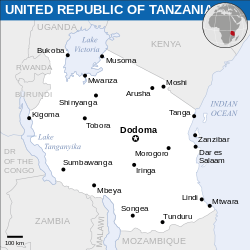Tanzania
United Republic of Tanzania Jamhuri ya Muungano wa Tanzania (Swahili) | |
|---|---|
| Motto: "Uhuru na Umoja" (Swahili) "Freedom and Unity" | |
| Anthem: Mungu ibariki Afrika 'God Bless Africa' | |
 Location of Tanzania (dark blue) in the African Union (light blue) | |
 | |
| Capital | Dodoma (de jure) Dar es Salaam (de facto) |
| Largest city | Dar es Salaam |
| Official languages | |
| Recognised regional languages | Arabic (Zanzibar) |
| National language | Swahili |
| Other languages |
|
| Religion | (2010 estimate)[1] Christianity 61.4% Islam 35.2% Folk Religion 1.8% Irreligious 1.4% Other 0.2% |
| Demonym(s) | Tanzanian |
| Government | Unitary presidential republic[2][3] |
| Samia Hassan Suluhu | |
| Philip Mpango | |
| Kassim Majaliwa | |
• Speaker | Job Ndugai |
| Ibrahim Hamis Juma | |
| Legislature | National Assembly |
| Independence from the United Kingdom | |
| 9 December 1961 | |
| 10 December 1963 | |
• Merger | 26 April 1964 |
• Current constitution | 25 April 1977 |
| Area | |
• Total | 947,303 km2 (365,756 sq mi) (31st) |
• Water (%) | 6.4 |
| Population | |
• 2021 estimate | 63,588,334[4][5] (28th) |
• 2012 census | 44,928,923 |
• Density | 47.5/km2 (123.0/sq mi) |
| GDP (PPP) | 2017 estimate |
• Total | $163.522 billion[6] |
• Per capita | $3,296[6] |
| GDP (nominal) | 2017 estimate |
• Total | $51.194 billion[6] |
• Per capita | $1,032[6] |
| Gini (2012) | 37.8[7] medium |
| HDI (2015) | low · 151st |
| Currency | Tanzanian shilling (TZS) |
| Time zone | UTC+3 (EAT) |
| Driving side | left |
| Calling code | +255[note 1] |
| ISO 3166 code | TZ |
| Internet TLD | .tz |
| |

Tanzania is a country in East Africa. The official languages are Kiswahili and English. It is next to Africa's biggest lake, Lake Victoria.
In 2017, there were about 54,000,000 people living in Tanzania.[10] They are divided into 120 tribes; none have more than 10% of the population. Tanzania is a multicultural society. There are many languages and religions in Tanzania; the main religions being Christianity and Islam.
The president of the United Republic of Tanzania is Samia Suluhu Hassan. Tanzania is a member of the United Nations, UNIDO, the World Bank, the International Monetary Fund, the Commonwealth of Nations, the Non-Aligned Movement, SADC, PTA, and the ADB. It is also signatory to the Lome Convention.
Mainland Tanzania (formerly Tanganyika) received independence in December 1961, while Zanzibar gained her independence in January 1964, through a revolution. The two countries joined to form the United Republic of Tanzania in April 1964. Until July 1992, Tanzania was a one-party state. Following a Presidential Commission, the country has started a multi-party political system. It has held successful general elections in 1995 and 2000. "
Tanzania is home to the Serengeti. Many animals such as lions and cheetahs live there.
Regions
[change | change source]
Tanzania is divided into 31 Regions. 26 are on the mainland and five in Zanzibar.
Tanzania's regions are: Arusha · Dar es Salaam · Dodoma · Geita · Iringa · Kagera · Katavi · Kigoma · Kilimanjaro · Lindi · Manyara · Mara · Mbeya · Morogoro · Mtwara · Mwanza · Njombe · Pemba North · Pemba South · Pwani · Rukwa · Ruvuma · Shinyanga · Simiyu · Singida · Songwe · Tabora · Tanga · Zanzibar Central/South · Zanzibar North · Zanzibar Urban/West
Related pages
[change | change source]Notes
[change | change source]References
[change | change source]- ↑ CIA World Factbook Archived 2019-05-11 at the Wayback Machine 2010. Retrieved 23 May 2017.
- ↑ David Lawrence (2009). Tanzania: The Land, Its People and Contemporary Life. Intercontinental Books. p. 146. ISBN 978-9987-9308-3-8.
- ↑ "About the United Republic of Tanzania". Permanent Representative of Tanzania to the United Nations. Archived from the original on 19 February 2011. Retrieved 31 January 2015.
- ↑ "World Population Prospects 2022". population.un.org. United Nations Department of Economic and Social Affairs, Population Division. Retrieved July 17, 2022.
- ↑ "World Population Prospects 2022: Demographic indicators by region, subregion and country, annually for 1950-2100" (XSLX). population.un.org ("Total Population, as of 1 July (thousands)"). United Nations Department of Economic and Social Affairs, Population Division. Retrieved July 17, 2022.
- ↑ 6.0 6.1 6.2 6.3 Tanzania. IMF.org
- ↑ "GINI Index". The World Bank. Retrieved 14 October 2014.
- ↑ "2016 Human Development Report" (PDF). United Nations Development Programme. 2016. Retrieved 21 March 2017.
- ↑ "UPDATE 2-Tanzania's GDP expands by 32 pct after rebasing – officials". Reuters. 19 December 2014. Archived from the original on 8 February 2018. Retrieved 19 December 2014.
- ↑ "The World Factbook — Central Intelligence Agency". www.cia.gov. Archived from the original on 2019-05-11. Retrieved 2018-02-06.



